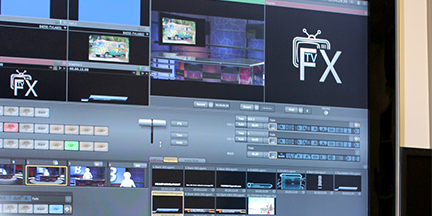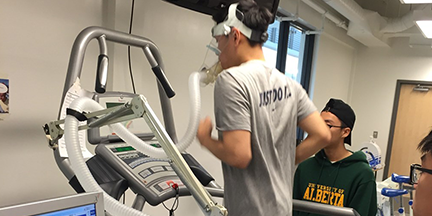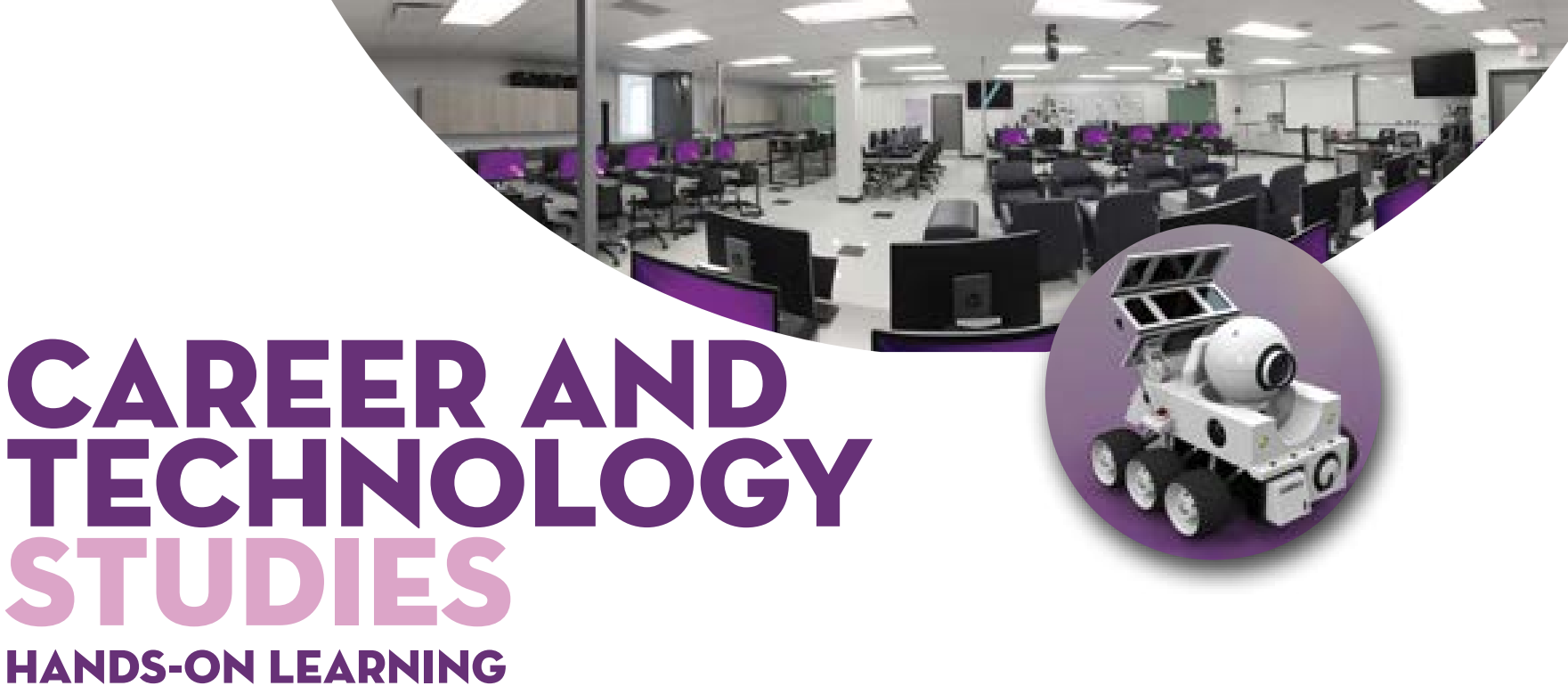Career and Technology Studies (CTS) provides students in Grades 10 to 12 with “hands on learning” and activity centered learning. Introductory courses are meant to be exploratory and offer wide varieties of experiences. The Career & Technology Studies (CTS) program helps you acquire the knowledge, skills and attitude for a career that is relevant to your interests. The entire CTS program centers around five industry clusters and 28 occupational areas organized into one-credit courses.
St. Francis Xavier High School CTS department boasts a foods lab, building construction and automotive lab, a digital broadcast studio for audio and video production and of the six available computer labs, two are completely dedicated to CTS courses.
Consider that CTS courses provide:
- Career direction
- Preparation for a career choice
- Work experience
- Advanced document preparation and research skills for post secondary education
- Practical, lifelong skills
Each CTS course is comprised of several modules, where a credit is assigned to each successfully completed module. Marks are assigned when the entire course has been completed.
Business
This course is an introduction to the world of business, with a specific focus on finance and entrepreneurship. Students begin with an overview of the banking system, money and
budgeting, and accounting principles. Students examine and begin to recognize possible business opportunities in their daily life. As students venture through the process of planning a business opportunity they will develop skills to recognize risk, strategies, and resources available to them. By working as a team and developing leadership, students are asked to assess their business venture and critique with their classmates.
GRADE 10
- Personal Financial Information
- Enterprise and Innovation
- Elements of a Venture Plan
GRADE 11
- Marketing and Management
- Marketing and Venture
- Promotion – Print Advertisement
GRADE 12
- Promotion and Sales Techniques
- Setting up a Retail Store
- Promotion and Broadcast Advertising
Computer Science
In grade 10 students will learn how to plan, implement, and maintain computer programs using an introductory programming language called Scratch. One of the major projects will be to develop and program an interactive game. In grade 11 students learn the fundamentals of a very popular and powerful programming language called C++. In grade 12 students will have the background necessary to dive into advanced topics like object oriented programming, and dynamic data structures. If there is time, they will also apply their programming skills in designing, building and programming autonomous robots in the C++ language.
Students who finish the grade 12 modules of computing science can use Computer Science 30 as one of their prerequisite science courses to gain admittance into a postsecondary program.
Computing Science courses are designed for students who plan to enroll in the faculties of science, engineering, or information technology at a university or college. Computing Science is an academic course and a minimum of 65% in grade 9 math is highly recommended.
GRADE 10
- Computing Science 1
- Structured Programming 1
- Structured Programming 2
GRADE 11
- Computer Science 2
- Procedural Programming 1
- Data Structures 1
- Files and File Structures 1
- Second Language Programming 1
GRADE 12
- Computer Science 3
- Iterative Algorithm 1
- Object Oriented Programming 1
- Recursive Algorithms 1
- Dynamic Data Structures 1
- Time Permitting Robotics Programming 1
- Robotics Programming 2
Construction
This course is an introduction to safety, tool, and machine use in industrial shops. The course revolves around metal fabrication, welding and wood construction. The focus of metal fabrication is the exploration of the natural qualities and uses of metal in our daily life. Useful projects such as decorative boxes and fold out tables are constructed as well as machine maintenance and safety. Students are challenged in welding fabrication when they are introduced to new techniques and styles. Wood work becomes more elaborate. Projects involving wood joints and more precise “fit up” are learned. Creating a personal inventory and fine tuning ones set of marketable skills is a highlight of this course. Correct tool choice, problem solving, planning and construction mastery are highlighted through the course.
GRADE 10
- Construction Tools and Materials
- Project Management
- Wood Turning Operations
- Semi-Automated Welding
- Fabrication Tools and Materials
- Basic Electric Welding
- Oxy acetylene Welding
- Building Construction
GRADE 11
- Furniture Making
- Finishing and Refinishing
- Oxyfuel Welding
- Gas Metal Arc Welding
- Arc Welding
- Custom Fabrication
GRADE 12
- Gas Tungsten Welding
- Arc Welding (higher level)
- Furniture Repair
- Tool Maintenance
- Furniture Making
Design Studies
Are you interested in 3D animation, such as what is done in films or games? Are you interested designing posters, logos and print media, combining your artistic side and computers? Are you interested in a trade, but like to work with computers as well? Does the idea of designing buildings or architecture interest you? Design Studies allows for students to focus in any of these areas. Students in this course create short computer animations, print media, work hands on with creating projects and have the opportunity to use a wide format printer or computer controlled router (CNC). Students who are interested in being an animator, using their artistic ability in a computer based setting, interior designer, landscape design, graphic artist, CNC operator architect or engineer should consider this program.
GRADE 10
- Sketch, Draw, & Model
- The Design Process
- 2-D Design
- 3-D Design
- Computer Assisted Drafting
- Technical Design & Drafting
GRADE 11
- 2-D Design Applications
- 3-D Design Applications
- CAD Applications
- Drafting/Design Applications
- Technical Drawing
GRADE 12
Students Focus on an area of interest. This may include:
- 2D Design
- 3D Design
- CAD
- Technical Drafting
- Architectural
- Engineering
- Interior Design
- Landscape Design or Modelling
Food Studies
Food Studies at the high school level comprises an in-depth focus on all aspects of food and the relationship of food to health, values and lifestyles. Food Studies will enable students to examine the significance of food as related to physiological, sociological and psychological satisfactions in their daily lives. Chemical and physical properties and factors affecting changes in these properties are studied as well as the production and consumption of food. Practical experiences encourage the development of consumer, management, and decision-making skills.
This is what students are saying about foods class. Foods class is fun. I get to work alongside my friends. We have a lot of opportunity to cook really good food. Before I came to this class, my cooking skills were very limited. Now I know how to select the right foods and the right combinations to make a delicious, nutritious and tasty meal.
YEAR 1
- Food basics
- Contemporary Baking
- Snacks & Appetizers
- Meal Planning 1
- Fast & Convenience Foods
- Canadian Heritage
YEAR 2
- Food Decisions & Health
- Bread Products
- Cake and Pastry
- Creative Cold Foods
- Fish and Poultry
- International Cuisine
YEAR 3
- Creative Baking
- Yeast Products
- Food Presentation
- Entertaining with Food
- Regional Cuisine
Media Broadcasting
This course is aimed at students who are interested in working in the field of broadcast media.
Students will work behind the scenes doing studio/camera work, and in front such, as being a journalist, news anchor, or sports reporter. The program begins with a focus on basic live news, with the addition of pre-recorded and edited items.
he students work within a studio setting with modern equipment to produce and broadcast throughout the school daily for announcements as well as for special events and tournaments.
Broadcasting will be done both in the school over FX TV, our school TV station, and externally, where students will be involved in uploading or streaming video to media sites (ex: You Tube). Students will learn and use various skills and techniques needed for broadcasting: such as technical aspects of production, public speaking, and ethics involved with Television Production.

GRADE 10
- Audio/Video
- Speaking and Presenting
- Visual Composition
- Web Design
- Personal Project
GRADE 11
- Correspondence
- Client Services
- AV Preproduction 1
- AV Production 1
- AV Postproduction 1
GRADE 12
- AV Preproduction 2
- AV Production 2
- AV Postproduction 2
- Project Management Tools
- AV Broadcasting
Photography/Video
Students will learn to employ fundamental elements and principles of design for various media. Students develop essential skills in camera use with a focus on basic composition, set-up and examination of exposure. Students will operate a camera to capture images and produce final display proofs. Students learn the technical and creative uses of aperture, shutter speed and ISO, and demonstrate how combinations of the three elements provide a correct exposure within the photographic triangle.
GRADE 10
- Visual Composition
- Media
- Audio/Visual Production
- Photography Introduction
- Photography Exposure
- Photography Digital Processing
GRADE 11
- Photography Composition
- Photography Lenses
- Photography Lighting
- Photography Communication
- Media Impact
- GRADE 12
Photojournalism
- Black and White Digital Techniques
- Photography Outdoors
- Digital Processing
Sports Medicine
This course will be of interest to students who are both athletes and/or aspire to work in the health care profession. Practical knowledge and skills are addressed through various topics including nutrition, injury management, health and wellness, sport psychology, basic anatomy and physiology and care of the musculoskeletal system. This course is a stepping stone to a number of certifications at the next level. Sports Medicine is one of the only high school courses where students study the human muscular and skeletal systems. This is a huge advantage to those students who are planning to pursue a career in the medical or sports related fields.

YEAR 1
- Health Services Foundations
- Sport Psychology 1
- Foundations of Training 1
- Musculoskeletal System
- Injury Management 1
- Technical Foundations for Injury Management
YEAR 2
- Nutrition for Recreation and Sport
- Sport Psychology 2
- Foundations of Training 2
- First Aid/AED Injury Management 2
- Anatomy of Joints
YEAR 3
- Sport Psychology 3
- Sport and Society
- REC Project
- Injury Management 3
- Human Movement Studies

